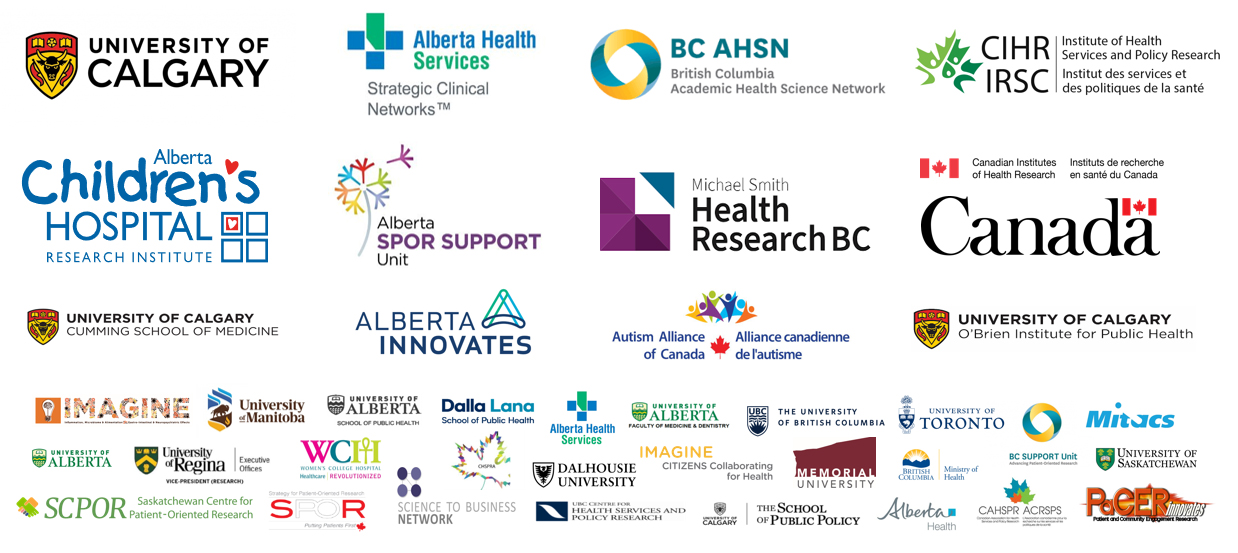The Health System Impact Program
Health System Impact Fellowship (Transcript)
Dr. Sacha Bhatia
Population Health and Values Based Health Systems Executive, Ontario Health
Health System Mentor
During the COVID pandemic, we have come to realize the importance that science and research plays in the development and implementation of policy.
Dr. Verna Yiu
President & CEO, Alberta Health Services
Health System Mentor
We have to be adaptive - and the way to be adaptive is to really look at the evidence.
Adalsteinn Brown
Dean, Dalla Lana School of Public Health / Co-Chair CHSPRA Training Modernization Advisory Group
We know we need help [to] transform the system into a learning a health system and at the end of the day, building a system that is more sustainable, that is higher quality, and that is more fair and equitable.
CIHR Health System Impact Fellowship Program
Dr. Meghan McMahon
Associate Director, CIHR Institute of Health Services and Policy Research.
The Health System Impact Fellowship is an embedded research program that places highly skilled, research-trained individuals directly within health system organizations.
Dr. Rick Glazier
Scientific Director, CIHR Institute of Health Services and Policy Research
It's a program designed to modernize the graduate training and post-doctoral training across our healthcare system.
Dr. Meghan McMahon
Fellows receive unparalleled mentorship from senior level decision-makers from within these organizations and academic experts from across the country.
What is the impact in the real world?
Dr. Meghan McMahon
They have created a cohort now of 145 fellows that are connected to 83 health system organizations across the country and 23 different academic institutions.
Dr. Gail Tomblin Murphy
Vice President, Research, Innovation and Discovery & Chief Nurse Executive, Nova Scotia Health
Health System Mentor
Our health system impact fellows working with research teams, working with policy makers, have really influenced bringing that evidence.
Dr. Meghan McMahon
They have contributed to program evaluations. They've contributed to informing the development of new services that will improve the lives of many.
Adalsteinn Brown
You will see organizations transform. They will become more agile, they will react more quickly, and they will react more confidently.
Dr. Gail Tomblin Murphy
We are totally transforming our healthcare system.
Why be a Health System Impact Fellow?
Dr. Deepa Singal
Research Scientist, Manitoba Centre for Health Policy / part-time Assistant professor, University of Manitoba Director, Scientific and Data Initiatives, Canadian Autism Spectrum Disorder Alliance
Health System Impact Fellow 2018
The fellowship has prepared me for the career that I have today. It gave me hands on experience and organizational management and governance.
Rae Jewett
PhD Candidate, Department of Geography and Planning, University of Toronto
Health System Impact Fellow 2019
I was after professional development skills, certainly, and stakeholder engagement skills. These are skills we don't pick up in academia typically.
Dr. Olivier Demers-Payette
Scientific Professional, Institut national d'excellence en santé et en services sociaux
Health System Impact Fellow 2017
[What attracted me to the fellowship was] the opportunity to contribute to a program and to be part of a collaboration between a health services and policy research organization and an academic institution
Dr. Verna Yiu
This fellowship allows you to have an entry or portal into organizations that actually deliver healthcare.
Dr. Meaghan Sim
Scientist, Implementation Science, Nova Scotia Health
Health System Impact Fellow 2018
It is a great opportunity to get outside your comfort zone, to develop skills outside of the academic setting.
Dr. Deepa Singal
The network that future fellows and current fellows have this opportunity to participate in – that's the real magic.
Why host a Health System Impact Fellow?
Dr. Rick Glazier
By having an embedded, really highly methodologically trained person now actually as part of your organization, it can really shorten that cycle of brining the evidence to decisions.
Dr. Sacha Bhatia
That helped our team be able to really conduct complex research projects within a very short period of time.
Dr. Verna Yiu
Having a highly trained fellow who can actually come in and do some value-add work to help inform our system was actually very, very important
Dr. Gail Tomblin Murphy
The difference that they're making for patients and our families, for our clinicians, for our system, and for government is phenomenal.
Rae Jewett
I would say go for it! This is going to enhance your life. It's going to enhance your career.
Dr. Deepa Singal
I don't think there is any other program out there like this.
Dr. Gail Tomblin Murphy
You will be so fortunate if you have the opportunity to host one, and hopefully multiple, fellows.
Dr. Sacha Bhatia
When you think about what is to come in a post-pandemic reality, we are going to need people. It's not a nice to have anymore, it's a have to have. To have researchers who understand how our complex health system and the organizations that sit in its ecosystem work. I can't think of something that is more important as we think about rebuilding our healthcare system and in fact, our society.
Acknowledgements
CIHR's Institute of Health Services and Policy Research would like to thanks all of its funding partners, including the Michael Smith Foundation for Health Research, the Fonds de recherche du Québec – santé, the Saskatchewan Health Research Foundation, the New Brunswick Health Research Foundation and Mitacs, for being instrumental to the Health System Impact Fellowship's reach, uptake and success.
The Institute would also like to thank the Canadian Health Services and Policy Research Alliance, let by Dr. Diane Finegood, and its training modernization working group, co-chaired by Dr. Steini Brown and Dr. Stephen Bornstein, for providing the direction and leadership necessary to put Canada on the path towards training modernization.
Thank you to all of our partners:
- AdvantAge Ontario
- Alberta Health Services
- Alberta Health Services, Strategic Clinical Networks
- Alberta Ministry of Health
- Amaris Consulting
- Arthritis Alliance of Canada
- Autism Ontario
- BC Academic Health Science Network
- BC Cancer Agency
- BC Centre for Disease Control
- BC Ministry of Health
- BC Ministry of Mental Health & Addictions
- BC Observatory for Population & Public Health
- BC Patient Safety and Quality Council
- Better Outcomes Registry & Network (BORN) Ontario
- Canada Health Infoway
- Canadian Agency for Drugs for Technologies in Health
- Canadian Blood Services
- Canadian Foundation for Healthcare Improvement
- Canadian Institute for Health Information
- Canadian Nurses Association
- Canadian Red Cross
- Canadian Society for International Health
- Cancer Care Ontario
- Centre intègre universitaire de santé et de services sociaux du Centre ouest de l'Île de Montréal
- Centre intégré de santé et de services sociaux de Chaudière-Appalaches
- Centre intégré de santé et de services sociaux de la Montérégie-Centre
- Centre intègre universitaire de santé et de services sociaux l'Ouest de l'Île de Montréal
- Centre intégré universitaire de santé et de services sociaux de la Capitale-Nationale
- Centre for Addiction and Mental Health
- Champlain Maternal Newborn Regional Program
- Child Health BC - BC Children's Hospital
- Children's' Hospital of Eastern Ontario (CHEO)
- CIET Canada
- City of Hamilton, Public Health Services
- Community-Based Research Centre
- Community Living BC
- Correctional Service Canada
- Deloitte LLP
- Dignitas International
- First Nations Health Authority
- Fraser Health Authority
- Government of Saskatchewan
- Gwich'in Tribal Council
- Hamilton Niagara Haldimand Local Health Integration Network
- Health Standards Organization
- Healthy Child Manitoba
- Heart and Stroke Foundation
- Hospital for Sick Children
- Institut national de santé publique du Québec (INSPQ)
- Institut national d'excellence en santé et services sociaux (INESSS)
- Institute for Circumpolar Health Research
- Institute of Clinical Evaluative Sciences (IC/ES)
- IWK Health Centre
- Joseph Brant Hospital
- Manitoba Health
- National Microbiology Laboratory, PHAC
- North York General Hospital
- Northern Health Authority
- Nova Scotia Department of Health and Wellness
- Nova Scotia Health Authority
- Ontario Hospital Association
- Ontario Long Term Care Association
- Ontario Neurotrauma Foundation
- Peel Public Health
- Policy Wise for Children and Families
- Public Health Agency of Canada
- Public Health Ontario
- Queen's Family Health Team
- SE Research Centre
- Saint John Human Development Council
- Saskatchewan Health Authority
- Saskatchewan Ministry of Health
- Saskatoon Health Region
- See Things My Way
- St. Michael's Hospital
- Sunnybrook Health Sciences Centre
- Toronto Rehabilitation Institute
- The City of Calgary
- The Eastern Ontario Regional Laboratory Association
- Trillium Health Partners
- University Health Network
- University of Ottawa Heart Institute
- Vancouver Coastal Health
- Victoria Hospice
- Women's College Hospital
- York Region Paramedic and Senior Services
- Carleton University
- Dalhousie University
- McMaster University
- Mount Saint Vincent University
- Simon Fraser University
- Université Concordia
- Université Laval
- Université McGill
- Université de Montreal
- Université d'Ottawa
- Université de Sherbrooke
- University of Alberta
- University of British Columbia
- University of Calgary
- University of Guelph
- University of Manitoba
- University of Northern British Columbia
- University of Regina
- University of Saskatchewan
- University of Toronto
- University of Victoria
- University of Waterloo
- University of Western Ontario
About the program
The Health System Impact (HSI) program provides highly qualified PhD trainees, postdoctoral researchers, and (new!) early career researchers in health services and policy research/related fields with the opportunity to develop embedded research projects/programs that address the most pressing problems faced by health system organizations and to support evidence-informed decision-making.
Overall, the HSI program aims to:
- Support emerging leaders to develop their embedded research experience, professional competencies, and potential for impact
- Grow a strong cadre of embedded researchers positioned to play a key role in evidence-informed health system improvement that advances the Quadruple Aim and health equity
- Develop embedded research capacity within health system organizations and catalyze collaborations between academic and health system organizations to contribute to advancing learning health systems across Canada
- Support diverse and impact-oriented career pathways for health system embedded researchers
Program components
The HSI program comprises three streams aligned to different career stages:
- PhD & Postdoctoral Fellow Streams: These streams are for PhD trainees and postdoctoral researchers who are currently enrolled in a doctoral program or have completed their PhD, and provides a one or two-year embedded research experiential learning opportunity within a health system organization. Learn more.
- Early Career Embedded Researcher Stream: This stream is for early career researchers and provides a four-year award to develop their role, program of research, and contributions as embedded researchers within health system organizations. Learn more.
Together, 245 Health System Impact Fellows have been or are currently embedded within 115 health system organizations and connected to 25 universities to accelerate evidence-informed health system improvement. Learn more about their notable and wide-ranging impacts in our Embedded Research Impact Casebook.
Background
Modernizing Health Services and Policy Research Training for Greater Impact
The Health System Impact (HSI) program was one of several outputs of the 2015 Pan-Canadian Training Modernization Strategy, which identified key strategic directions to modernize university-based Health Services and Policy Research (HSPR) doctoral and post-doctoral training programs for optimized career readiness and impact. It started in 2017 as the HSI Fellowship for doctoral trainees and post-doctoral fellows. Since then, embedded research career pathways were identified as a priority for consideration and in 2022, the HSI program was refreshed to include a new stream for early career researchers (ECRs). This stream is intended to help establish a career pathway for embedded researchers and generate additional research capacity to advance learning health systems (LHSs) across Canada.
Central to this program is participation in a national cohort and professional development aligned to the HSPR Enriched Core Competency Framework.
The HSI program is led by the CIHR Institute of Health Services and Policy Research's (CIHR-IHSPR) in collaboration with multiple CIHR institutes and initiatives, funding agencies, health system organizations and universities.
The program supports CIHR-IHSPR's 2021-2026 strategic plan priority 3, “Integrate evidence into health services and policy decisions for improved health care system performance and outcomes,” and priority 4, “Strengthen capacity for solution-oriented research and evidence-informed health care system transformation.” It also advances CIHR's strategic plan priorities A (A1. Champion a more inclusive concept of research excellence), B (B3. Enhance training and career support) and E (E1. Advance the science of knowledge mobilization and E3. Strengthen Canada's health systems through innovation).
Funding Opportunities
Current Funding Opportunities
Archived Funding Opportunities
- 2023 Health System Impact Embedded Early Career Researcher Award
- 2023 HSI Fellowship Funding Opportunity
- 2022 HSI Fellowship Funding Opportunity
- 2021 HSI Fellowship Funding Opportunity
- 2021 Health System Impact Fellowship National Cohort Retreat
- 2019 HSI Fellowship Funding Opportunity
- 2018 HSI Fellowship Funding Opportunity
- 2017 HSI Fellowship Funding Opportunity
- 2016 Training Modernization Start-Up Grants
National Cohort Training Program
National Cohort Training Program
Contact information
Questions for the NCTP? Contact: hsif.nctp@ucalgary.ca
In 2021, the Institute of Health Services and Policy Research was thrilled to announce and congratulate the awardees of the Health System Impact (HSI) Fellowship National Cohort Training Program (NCTP) funding opportunity.
The NCTP initiative provides HSI Fellows, alumni fellows, and their health system and academic supervisors with novel training, networking and collaboration opportunities designed to enhance their leadership competency and ability to apply their advanced research skillset to address pressing and complex health system challenges. The training is aligned to the health services and policy research enriched core competency framework and will aim to amplify Fellows' embedded research impact and contribution to evidence-informed health system improvement.
The NCTP is led by a national consortium consisting of 65 members, 22 of which were previous HSI Fellows and 14 of which were HSI Fellow mentors. The consortium includes representation from 8 provinces and brings together a diverse set of perspectives with health system leaders and emerging leaders across academia and the health care delivery, public, not-for-profit, and private sectors. Overall, their unique insight into the HSI Fellowship program, as well as connection to health system organizations and decision-makers, provides a strong basis for advancing HSI Fellow cohort development and more broadly, learning health systems across Canada.
For more information, please refer to the NCTP Funding Opportunity.
Meet the co-Principal Applicant team:

Dr. Deborah Marshall
University of Calgary; HSI Fellow Academic Supervisor; Nominated Principal Applicant

Dr. Elena Lopatina
University of Calgary; HSI Fellow Alumna

Tracy Wasylak
Alberta Health Services; HSI Fellow Host Partner Supervisor

Dr. Kiran Pohar Manhas
Alberta Health Services; HSI Fellow Alumna

Dr. Tom Noseworthy
University of Calgary; HSI Fellow Host Partner Supervisor

Dr. Deepa Singal
University of Manitoba; HSI Fellow Alumna

Dr. Stirling Bryan
British Columbia Academic Health Science Network

Dr. Kim McGrail
University of British Columbia; HSI Fellow Academic Supervisor

Dr. Malcolm Doupe
University of Manitoba; HSI Fellow Academic Supervisor

Dr. Natasha Gallant
University of Saskatchewan; HSI Fellow Alumna

Sandra Zelinsky
Alberta SPOR Support Unit; Patient Engagement Researcher
Quote from Dr. Deborah Marshall, NPA:
"We are eager to champion and advance the community of practice for the next generation of health services and policy researchers – advancing high-performing and patient-centred learning health systems across Canada. We have an amazing collaborative team and I am honoured to be part of it. We are grateful to CIHR-IHSPR and our diverse partners and supporters, including the University of Calgary, the University of Calgary Cumming School of Medicine, the BC Academic Science Health Network, the Michael Smith Foundation for Health Research, the O'Brien Institute for Public Health, the Alberta SUPPORT Unit, Alberta Innovates, and Alberta Health Services Strategic Clinical NetworksTM."
Quote from Dr. Elena Lopatina, Co-PI & HSI Fellow Alumna
"I am passionate about the HSI Fellowship – it gave me opportunities for professional development and networking beyond what I could have imagined in doctoral training. I am really looking forward to working with the incoming fellows to share these same opportunities."
Partners involved in the National Cohort Training Program:

Long description
University of Calgary, Alberta Health Services Strategic Clinical NetworksTM, British Columbia Academic Science Health Network, CIHR Institute of Health Services and Policy Research, Alberta Children's Hospital Research Institute, Alberta SPOR SUPPOR Unit, Michael Smith Health Research BC, Canadian Institutes of Health Research, Government of Canada, University of Calgary Cumming School of Medicine, Alberta Innovates, Autism Alliance of Canada, University of Calgary O'Brien Institute for Public Health, IMAGINE, University of Manitoba, University of Alberta School of Public Health, Dalla Lana School of Public Health, Alberta Health Services, University of Alberta Faculty of Medicine and Dentistry, University of British Columbia, University of Toronto, BC SUPPOR Unit, Mitacs, University of Alberta, University of Regina, Women's College Hospital, Canadian Health Services and Policy Research Alliance, Dalhousie University, IMAGINE CITIZENS Collaborating for Health, Memorial University, British Columbia Ministry of Health, University of Saskatchewan, Saskatchewan Centre for Patient Oriented Research, Strategy for Patient-Oriented Research, Science to Business Network, University of British Columbia Centre for Health Services and Policy Research, University of Calgary School of Public Policy, Alberta Health, Canadian Association for Health Services and Policy Research, University of Calgary Patient and Community Engagement Research (PaCER) Patient Program
Partnerships
Partnering on the Health System Impact Program
The Health System Impact Fellowship program is led by CIHR-IHSPR but made possible because of partnerships across several funders, health system organizations and universities.
Partner Linkage Tool
Funding Partners
- Fonds de recherche du Québec – Santé (FRQS)
- Michael Smith Health Research BC (Health Research BC)
- Mitacs
- New Brunswick Health Research Foundation (NBHRF)
- Research Nova Scotia
- Saskatchewan Health Research Foundation (SHRF)
- 11 CIHR InstitutesFootnote *, the Strategy for Patient-Oriented Research, CIHR's Healthy Cities Research Initiative & CIHR's Science Policy Branch
Health System Organization & University Partners
-
Health System Organizations
- AdvantAge Ontario
- Alberta Health Services
- Alberta Health Services, Strategic Clinical Networks
- Alberta Ministry of Health
- Alliance for Health Policy and Systems Research, World Health Organization
- Amaris Consulting
- Arthritis Alliance of Canada
- Autism Alliance of Canada
- Autism Ontario
- BC Academic Health Science Network
- BC Cancer Agency
- BC Centre for Disease Control
- BC Ministry of Health
- BC Ministry of Mental Health & Addictions
- BC Observatory for Population & Public Health
- BC Office of the Provincial Health Officer
- BC Patient Safety and Quality Council
- Better Outcomes Registry & Network (BORN) Ontario
- Canada Health Infoway
- Canadian Agency for Drugs for Technologies in Health
- Canadian Blood Services
- Canadian Cancer Society Research Institute
- Canadian Foundation for Healthcare Improvement
- Canadian Institute for Health Information
- Canadian Mental Health Association
- Canadian Nurses Association
- Canadian Nutrition Society
- Canadian Red Cross
- Canadian Society for International Health
- Cancer Care Ontario
- CancerCare Manitoba
- Centre intègre universitaire de santé et de services sociaux du Centre ouest de l'Île de Montréal
- Centre intégré de santé et de services sociaux de Chaudière-Appalaches
- Centre intégré de santé et de services sociaux de la Montérégie-Centre
- Centre intègre universitaire de santé et de services sociaux l'Ouest de l'Île de Montréal
- Centre intégré universitaire de santé et de services sociaux de la Capitale-Nationale
- Centre for Addiction and Mental Health
- Centre of Excellence on Partnership with Patients and the Public
- Champlain Maternal Newborn Regional Program
- Child Health BC - BC Children's Hospital
- Children's' Hospital of Eastern Ontario (CHEO)
- CIET Canada
- City of Hamilton, Public Health Services
- Community-Based Research Centre
- Community Living BC
- Correctional Service Canada
- Deloitte LLP
- Dignitas International
- East Toronto Health Partners
- First Nations Health Authority
- Fraser Health Authority
- Government of Saskatchewan
- Government of Yukon
- Gwich'in Tribal Council
- Hamilton Health Sciences
- Hamilton Niagara Haldimand Local Health Integration Network
- Health Canada
- Health Standards Organization
- Healthy Child Manitoba
- Heart and Stroke Foundation
- Hospital for Sick Children
- Hypertension Canada
- Institut national de santé publique du Québec (INSPQ)
- Institut national d'excellence en santé et services sociaux (INESSS)
- Institut Nazareth et Louis-Braille
- Institute for Circumpolar Health Research
- Institute of Clinical Evaluative Sciences (IC/ES)
- Interior Health Authority
- IWK Health Centre
- Jack.org
- Joseph Brant Hospital
- Manitoba Health
- McGill University Health Centre
- National Microbiology Laboratory, PHAC
- Niagara Emergency Medical Services
- North York General Hospital
- Northern Health Authority
- Nova Scotia Department of Health and Wellness
- Nova Scotia Health Authority
- NS Education & Early Childhood Development
- Ontario Hospital Association
- Ontario Long Term Care Association
- Ontario Medical Association
- Ontario Ministry of the Solicitor General
- Ontario Neurotrauma Foundation
- The Ottawa Hospital
- Peel Public Health
- Perley Health Community of Care
- Policy Wise for Children and Families
- Public Health Agency of Canada
- Public Health Ontario
- Queen's Family Health Team
- SE Research Centre
- Saint John Human Development Council
- Sanctum Care Group
- Saskatchewan Health Authority
- Saskatchewan Ministry of Health
- Saskatoon Health Region
- See Things My Way
- Statistics Canada
- St. Joseph's Healthcare
- St. Michael's Hospital
- Sunnybrook Health Sciences Centre
- Toronto Rehabilitation Institute
- The City of Calgary
- The Eastern Ontario Regional Laboratory Association
- Trillium Health Partners
- United Way British Columbia
- University Health Network
- University of Ottawa Heart Institute
- Vancouver Coastal Health
- Vancouver Island Health Authority
- VHA Home HealthCare
- Victoria Hospice
- Women's College Hospital
- York Region Paramedic and Senior Services
-
Universities
- Carleton University
- Concordia University
- Dalhousie University
- McGill University
- McMaster University
- Mount Saint Vincent University
- Simon Fraser University
- Université de Sherbrooke
- Université Laval
- Université de Montreal
- Université du Québec à Montréal
- University of Alberta
- University of British Columbia
- University of Calgary
- University of Guelph
- University of Manitoba
- University of Northern British Columbia
- University of Ottawa
- University of Regina
- University of Saskatchewan
- University of Toronto
- University of Victoria
- University of Waterloo
- University of Western Ontario
- York University
What's in it for you? The Benefits of Becoming Involved
For embedded researchers:
- Your research and analytic talents will contribute to addressing the critical challenges facing health system organizations outside of the traditional university setting (e.g., public, private for-profit, and not-for-profit organizations that are not universities). In addition, you will develop professional experience, new skills, and networks;
- You will learn first-hand how health system organizations work, how decisions are made, and how research and analytic skills contribute broadly to improving an organization's performance;
- You will acquire unique professional development training and develop an expanded set of competencies (e.g., leadership, negotiation, project management, change management) all designed to accelerate your professional growth and better prepare you to embark on a wider range of career paths with greater impact;
- As a participant of a national cohort of embedded researchers and leaders from academic and health system and related organizations, you will benefit from unparalleled mentorship and networking opportunities.
For health system organizations:
- You will benefit from direct access to the country's rising stars in health services and policy research and related fields (e.g., population health, epidemiology, data science, health economics);
- Your organization will benefit from expertise in cutting- edge methodologies and analytics to advance your goals and priorities, generate innovative solutions grounded in the best available evidence, and build in-house capacity for research;
- Your organization will expand its relationships with the academic sector and the health research community;
- By contributing to training, mentoring, and preparing a cadre of the country's up-and-coming brightest minds, your organization will be playing a leadership role in securing a bright future for your sector.
For university training programs:
- By aligning scholarship with health system improvement, your institution will be well positioned to demonstrate the versatility of PhD graduates and the value-added quotient that they bring to help inform health policy and system transformation;
- You will foster meaningful and impactful career paths outside of the academy, accelerate career growth and impact, and encourage the skills and expertise of PhD trained individuals for broader societal contribution;
- You will contribute to the expansion and enrichment of the traditional training environment by engaging health system and related organizations in preparing a cadre of promising PhD graduates for successful careers.
Profiles
Health System Impact Embedded Researcher Profiles
Learn more about our current & previous Health System Impact embedded researcher projects:
| Year | Stats | Link |
|---|---|---|
| 2024 | The 2024 Health System Impact Embedded Early Career Researcher Award supported 12 researchers. | Learn more about the 2024 Awardees |
| 2023 | The 2023 Health System Impact Fellowship awards supported 36 Health System Impact Fellows (11 PhD trainees and 25 post-doctoral fellows). | Learn more about the 2023 Fellows |
| 2022 | The 2022 Health System Impact Fellowship awards supported 43 Health System Impact Fellows (18 PhD trainees and 25 post-doctoral fellows). | Learn more about the 2022 Fellows |
| 2021 | The 2021 Health System Impact Fellowship awards supported 56 Health System Impact Fellows (17 PhD trainees and 39 post-doctoral fellows). | Learn more about the 2021 Fellows |
| 2019 | The 2019 Health System Impact Fellowship awards supported 51 Health System Impact Fellows (20 PhD trainees and 31 post-doctoral fellows). | Learn more about the 2019 Fellows |
| 2018 | The 2018 Health System Impact awards supported 49 Health System Impact Fellows (20 PhD trainees and 29 post-doctoral fellows). | Learn more about the 2018 Fellows |
| 2017 | The 2017 Health System Impact awards and Training Modernization Start-Up Grants supported 46 Health System Impact Fellows (all post-doctoral fellows). | Learn more about the 2017 Fellows |
Learn more about our alumni and careers post-Health System Impact program: Health System Impact Alumni Career Profiles
Resources
Resources
- 2017-19 Embedded Research Impact Casebook
- Enriched core competencies for HSPR
- How Do We Build the Human Capital for a True Learning Healthcare System?
- Minister's Announcements:
- 2023: Government of Canada invests more than $4.7M in health researchers who will tackle high-priority challenges in our health systems
- 2022: Government of Canada invests more than $4.7M to give next generation of health researchers hands-on experience tackling health system challenges
- 2021: Government of Canada investing in talented scholars through the Health System Impact Fellowship program
- 2017: A new $5.8 million investment embeds PhD graduates within healthcare organizations for greater impact
- Collection of manuscripts on Training Modernization in a November 2019 special issue of the journal of Healthcare Policy
- Training Modernization Strategy (Canadian Health Services and Policy Research Alliance: Report from the Working Group on Training [ PDF (323 KB) - external link ])
- Health System Impact Fellowship: Program Overview and Impacts [ PDF (937 KB) - external link ]
- Date modified: